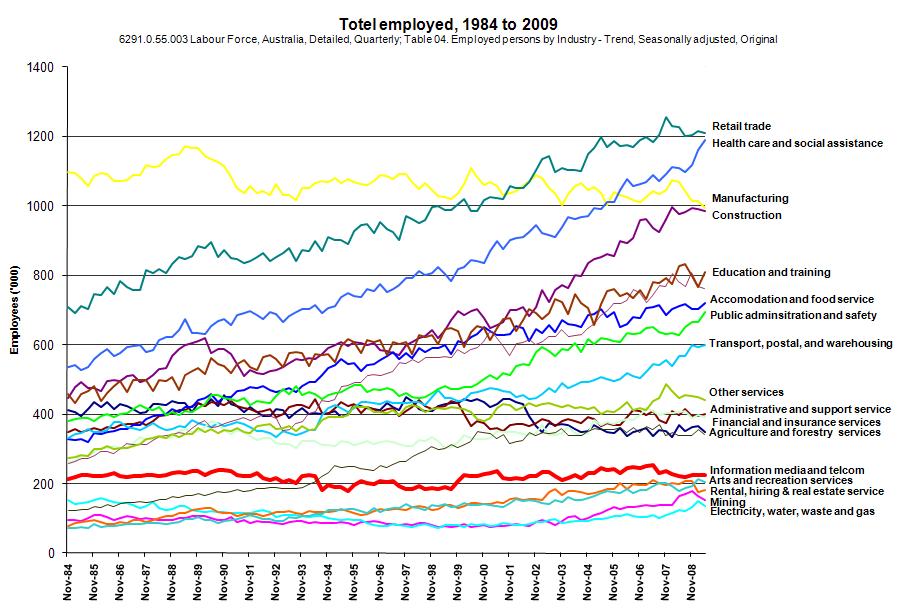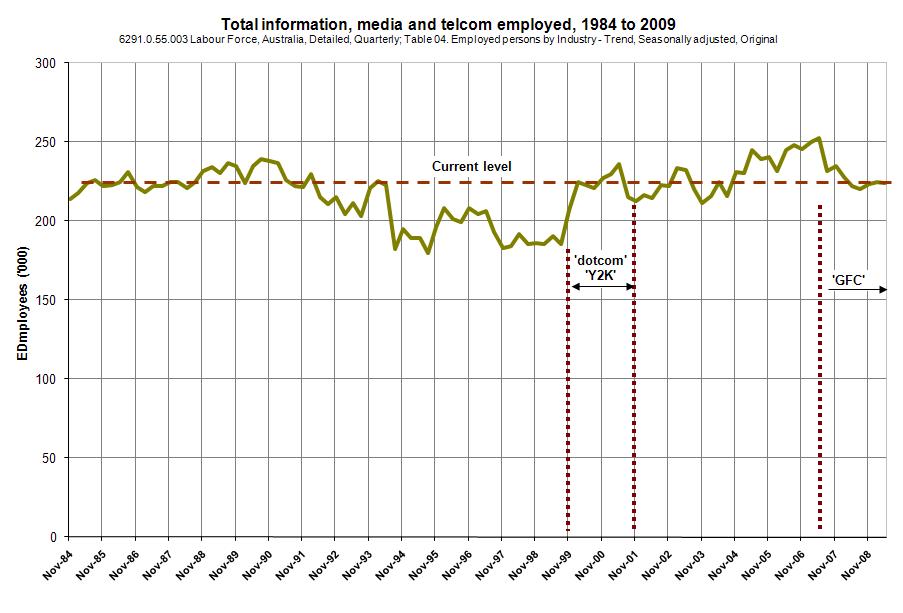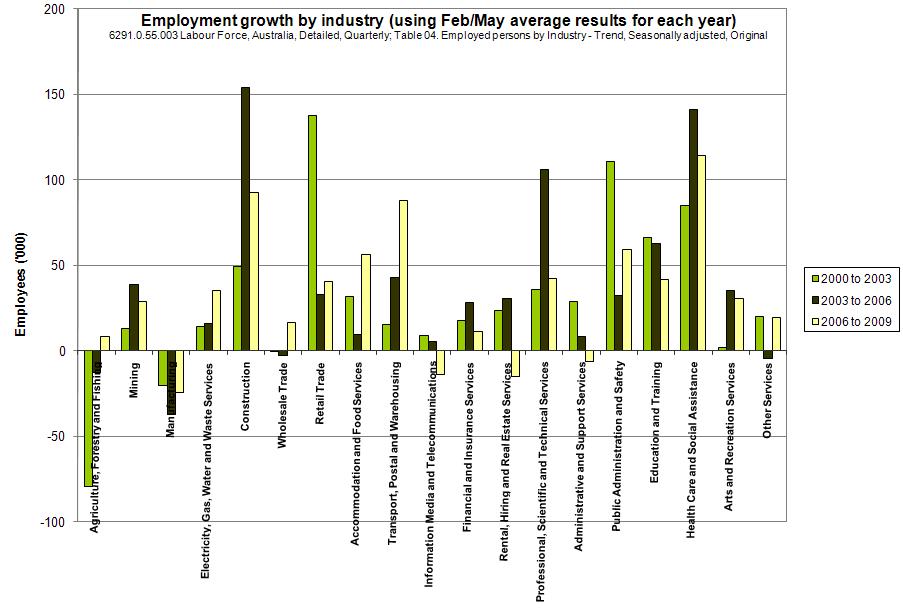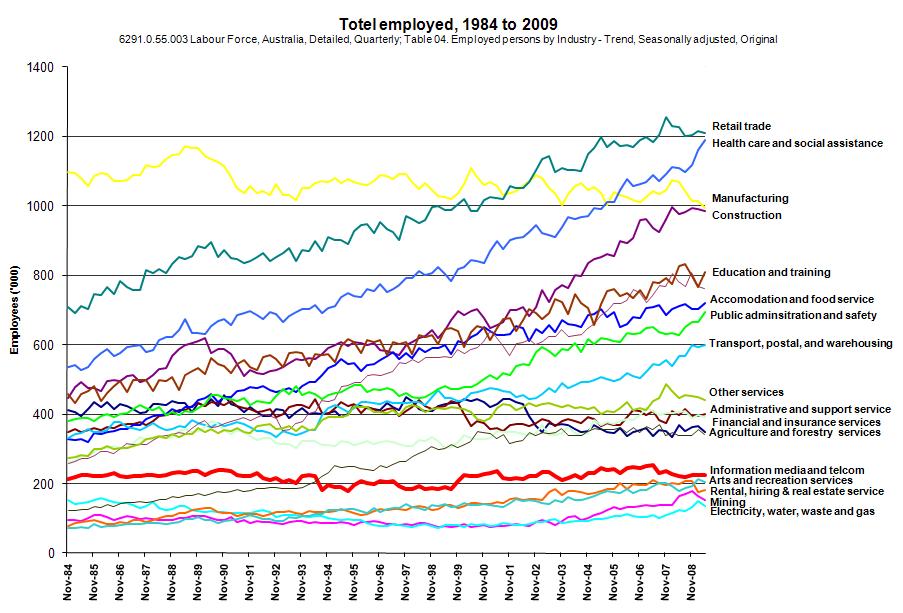Information, media and telecommunications: employment is down, and the future is bright
A bit of investigation for an upcoming research project provides an opportunity for bloggable show-and-tell. Our industry is one with a colorful past and a bright future, despite the direction on the graph.
Employment Levels by Industry
There are many measures for the economy, including revenue, costs, profit, social investments, and greenhouse gas emissions. We specifically look at employment data based on its value from a wide variety of perspectives, including politics (voters), marketing (consumers), entertainment (audience), non-profit enterprises (volunteers), and human resources (staff).

A look over the past 25 years paints a picture of steady growth across most industries. Manufacturing is an exception deserving our compassion, as it sheds jobs on a near continual basis due largely to offshore competition. Given my day job, my particular interest is in what the Australian Bureau of Statistics terms the “information, media and telecomunications” sector. Specifically, I am curious in the impacts that the global financial crisis (GFC) have had on the industry relative to the impact of “dotcom” and the telecom bust of 2000.
Dotcom and employment
Most say “dotcom” started around 1995, around the time Netscape realised over $2 billion in value at the end of the first day of trading without having returned a cent in profit. Between ’97 and ’00, over 12,000 “Internet companies” caught the wave and floated on the US market. The graph shows Australia may have been a bit late on the uptake and delayed on the dip, as 5,000 of those startup companies went under in 2000.

While the closely associated but distinct telecom crash resulted in a drop of $2 trillion in US stock market value and a loss of over 500,000 jobs, dotcom itself was not the bust that everyone made it out to be. Sure, there was a dysfunctional circular reference with venture capitalists and speculative prospects each trying to grab a higher rung on a ladder that didn’t exist. However, the underlying advances in technology still had value for business. The industry matured, and most of us found our way back into some sort of gainful employment.
What I now find interesting is that our industry’s employment levels have returned to post-dotcom levels. Between 2000 and 2007, industry staffing levels increased 13%. Those gains were lost in 12 months by 2008. Having to hire staff as a year-on-year Deloittes Fast 50 company, I will say that the 13% provides a tangible relief in available staff. We were fortunate to have the benefit of a positive culture and strong word-of-mouth, but continued staff growth post-GFC is a bit easier.
A healthy negative growth?
The Information, Media and Telecom industry demonstrates a unique pattern, shared only by the related Admin and Support Serrvices sector. We have experienced a successive decrease in growth over the past decade culminating in contraction over the past three years.

Influences on the numbers are so much more than can be explained away in a brief blog. But looking at the big picture across industries provides a few take-aways:
- Rationalisation
The ebb and tide of centralization and outsourcing shifts staff in and out of the industry. Companies in the sector need to focus on core competencies while adapting to rapid changes in technology and social norms. - There are still markets to serve
Decreased growth is still growth. Markets are still growing and still have business needs that our industry can satisfy. Shrinking markets should not be written off, as the need for efficiencies from automation and access to new market channels may be as great as or greater than the expanding sectors. - Business maturity 201
Dotcomquickly weeded out those building a business based solely on implementing flaming, rotating, 3D JavaScript rollovers using Dreamweaver. The web industry in particular will continue to find the right balance of business acumen, innovation, stability, and structure. Every year I have been in the industry repeats the sentiment that this is the most exciting time. Now is no different.

